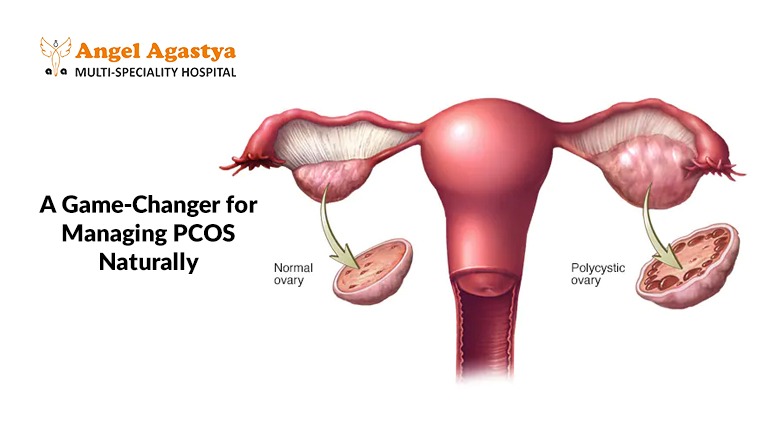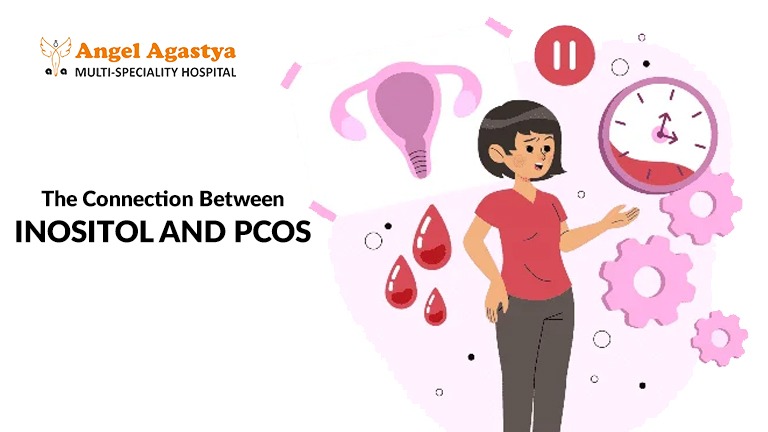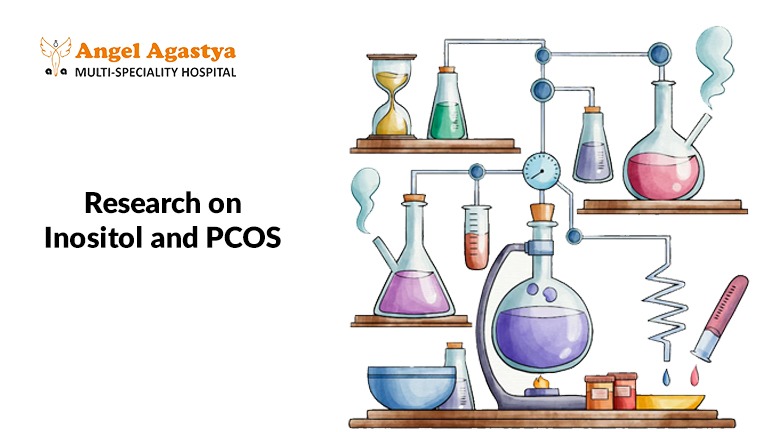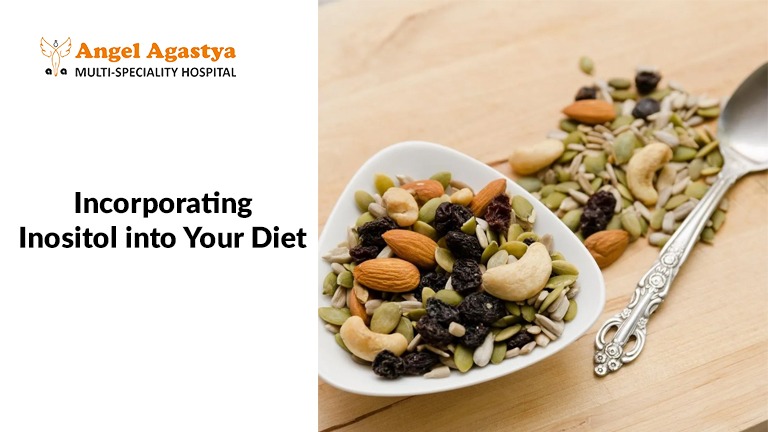Natural Treatment For PCOS With Inositol
“What if a simple, natural compound could help manage the symptoms of PCOS, improving your quality of life and boosting fertility??”

Introduction
Polycystic Ovary Syndrome (PCOS) affects millions of women worldwide and is known for its challenging symptoms—ranging from irregular periods and weight gain to excessive hair growth and fertility issues. Traditional treatments often involve medications like birth control pills or insulin sensitizers. However, many women are turning to natural treatment for PCOS with Inositol as a promising solution. Inositol, a nutrient found in the body and various foods, has gained significant attention for its potential to help manage PCOS symptoms.
Emerging research shows that natural treatment for PCOS with Inositol can play a significant role in managing PCOS symptoms, particularly when it comes to improving insulin sensitivity, regulating hormone levels, and promoting ovulation. This blog will delve deep into the science of Inositol, its connection to PCOS, and how you can incorporate it into your lifestyle to manage symptoms more naturally. Let’s take a closer look at this promising approach.
Understanding Inositol
Inositol is a type of sugar that influences the body’s insulin response, cellular communication, and even mood regulation. Though it’s found in many foods, supplements have become a popular way for individuals, especially those with PCOS, to benefit from its effects.

There are two primary forms of Inositol that are of particular interest for PCOS management—myo-inositol and D-chiro-inositol. Both forms are crucial for various cellular functions but serve slightly different roles. Myo-inositol is known for its influence on insulin signaling and ovarian function, while D-chiro-inositol affects insulin sensitivity and androgen levels. Together, these forms of natural treatment for PCOS with Inositol work synergistically to improve metabolic and reproductive health.
Inositol acts as a second messenger for insulin, meaning it helps transmit signals inside cells when insulin is present. This is particularly important for women with PCOS, as insulin resistance—a reduced sensitivity to insulin—is a hallmark of the condition. Besides insulin signaling, natural treatment for PCOS with Inositol is involved in fat metabolism, egg development in the ovaries, and mood regulation through neurotransmitter activity.
Understanding how inositol works at the cellular level provides a clearer picture of its potential in managing PCOS. Whether it’s improving how your body responds to insulin or balancing reproductive hormones, inositol is a key player in the quest to alleviate PCOS symptoms naturally.
The Connection Between Inositol and PCOS
PCOS is often characterized by a combination of insulin resistance, hormonal imbalances, and disrupted ovulation. This is where natural treatment for PCOS with Inositol comes in, offering promising results in addressing these core issues.

Women with PCOS often struggle with insulin resistance, meaning their cells don’t respond to insulin as effectively as they should. This results in elevated insulin levels, which can worsen hormonal imbalances by stimulating excess androgen (male hormone) production in the ovaries. Studies have shown that myo-inositol improves insulin sensitivity, helping to lower insulin levels and reduce the production of androgens. This is crucial, as managing insulin resistance with natural treatment for PCOS with Inositol can improve weight management, regulate menstrual cycles, and promote overall hormonal balance in women with PCOS.
Elevated androgen levels lead to symptoms like acne, excess facial and body hair (hirsutism), and scalp hair thinning. Natural treatment for PCOS with Inositol, particularly when combining myo-inositol with D-chiro-inositol, has been shown to lower androgen levels, helping to mitigate these frustrating symptoms. By addressing the root cause insulin resistance natural treatment for PCOS with Inositol can help balance the delicate hormone interplay that drives PCOS symptoms.
One of the primary challenges for women with PCOS is irregular or absent ovulation, which directly impacts fertility. Clinical studies suggest that natural treatment for PCOS with Inositol supplementation can improve ovulation rates in women with PCOS. Myo-inositol helps regulate ovarian function, encouraging the maturation of eggs and regular menstrual cycles. For women looking to conceive, natural treatment for PCOS with Inositol offers a natural, less invasive option compared to fertility drugs, while still enhancing the chances of successful ovulation and conception.
Through its dual effects on insulin and androgens, inositol provides a multifaceted approach to managing PCOS, making it an increasingly popular choice for women seeking natural relief from symptoms.
Research on Inositol and PCOS
The science behind natural treatment for PCOS with Inositol continues to grow, with clinical studies shedding light on its effectiveness.

Clinical Studies-Several studies have investigated the impact of natural treatment for PCOS with Inositol on PCOS symptoms. In one notable study, women with PCOS who took a combination of myo-inositol and D-chiro-inositol experienced significant improvements in insulin sensitivity, reduced androgen levels, and higher ovulation rates compared to those who took a placebo. Another study found that natural treatment for PCOS with Inositol supplementation led to improved egg quality and increased pregnancy rates among women undergoing fertility treatments.
Dosage and Administration: The dosage of natural treatment for PCOS with Inositol supplements can vary depending on the form being used and the individual’s needs. For women with PCOS, myo-inositol is often taken at doses of 2,000 to 4,000 mg per day, sometimes in combination with D-chiro-inositol in a 40:1 ratio. It’s essential to consult with a healthcare provider to determine the most appropriate dosage for your situation, as taking too much of any supplement can have unintended consequences.
While inositol is generally considered safe and well-tolerated, personalized dosing is key to maximizing its benefits for PCOS management.
Incorporating Inositol into Your Diet
While natural treatment for PCOS with Inositol is found in many foods, it’s often challenging to get the therapeutic doses needed to manage PCOS solely through diet.

Food Sources: Inositol is present in a variety of foods, including fruits like cantaloupe and oranges, vegetables like beans and leafy greens, and grains such as brown rice and oats. Boost your Inositol intake with nuts and seeds. However, the amount of Inositol found in food is relatively low compared to the levels required for therapeutic effects, making supplementation a more practical approach for women with PCOS.
Supplements: Natural treatment for PCOS with Inositol supplements are widely available in powder or capsule form, making them a convenient option for those looking to boost their intake. When choosing a supplement, it’s essential to select a high-quality product that provides the right balance of myo-inositol and D-chiro-inositol.
Before starting any new supplement regimen, always consult with your healthcare provider, especially if you’re already taking medications or other supplements for PCOS.
Additional Lifestyle Modifications
Natural treatment for PCOS with Inositol alone can offer significant benefits, but when combined with other lifestyle changes, it can amplify the results and help manage PCOS more effectively.

Healthy Diet: A balanced diet rich in whole foods is a foundational part of any natural treatment for PCOS with inositol. Prioritize nutrient-dense options like fruits, vegetables, whole grains, and lean proteins, while limiting processed foods and refined sugars. A diet low in refined carbohydrates can improve insulin sensitivity — which complements the action of inositol — and helps maintain hormonal balance, making your natural treatment for PCOS with inositol more effective.
Regular Exercise: Physical activity plays a key role in improving insulin sensitivity and supporting weight management, both of which are essential when following a natural treatment for PCOS with inositol. Aim for at least 30 minutes of moderate exercise most days — walking, cycling, or strength training can all help enhance the results of inositol supplementation in managing PCOS symptoms.
Weight Management: Even a modest weight loss of 5-10% can significantly improve hormone regulation, insulin sensitivity, and ovulation — all crucial when pursuing a natural treatment for PCOS with inositol. Combining inositol supplements with healthy weight management offers a powerful, holistic strategy to control PCOS symptoms and promote reproductive health.
Stress Management: Chronic stress can worsen PCOS symptoms by elevating cortisol levels, leading to further hormonal disruption. Integrating stress reduction techniques such as yoga, meditation, or deep breathing into your daily routine enhances the benefits of a natural treatment for PCOS with inositol, improving both emotional well-being and physical health.
By integrating these lifestyle changes with natural treatment for PCOS with inositol, women can adopt a comprehensive, evidence-based approach that addresses the root causes of PCOS rather than just masking the symptoms.
Conclusion
Natural treatment for PCOS with inositol is emerging as a highly effective, side-effect-friendly option for managing the complex symptoms of PCOS. From improving insulin sensitivity to regulating androgen levels and supporting ovulation, inositol offers a natural path to hormonal balance and improved reproductive health.
However, true success in managing PCOS comes from a holistic strategy — combining natural treatment for PCOS with inositol with dietary improvements, regular exercise, stress management, and professional medical guidance. Always consult your healthcare provider to ensure you’re using the right dosage and form of inositol suited to your body’s needs.
With the right approach, natural treatment for PCOS with inositol can empower you to regain control over your health, improve your quality of life, and even boost your fertility potential.
FAQs
What are the different types of inositol?
There are two main types of inositol that are commonly used for managing PCOS: myo-inositol and D-chiro-inositol. Myo-inositol is more abundant in the human body and plays a crucial role in insulin sensitivity and ovarian function. D-chiro-inositol also supports insulin sensitivity and helps reduce androgen levels. A combination of the two in a 40:1 ratio (myo-inositol to D-chiro-inositol) is often recommended for PCOS management.
How does inositol help with insulin resistance?
Inositol acts as a second messenger for insulin, helping the body’s cells respond more effectively to insulin signals. By improving insulin sensitivity, inositol reduces the amount of insulin circulating in the blood. This is particularly important for women with PCOS, as high insulin levels can lead to elevated androgen production and worsened symptoms like weight gain, acne, and irregular periods.
Can I get enough inositol from my diet?
Inositol is found in various foods like fruits (especially cantaloupe and oranges), beans, grains, and nuts. However, the levels of inositol in food are relatively low compared to the therapeutic doses used in PCOS studies. Most women with PCOS find it difficult to get enough inositol through diet alone, which is why supplements are often recommended.
Are there any side effects to taking inositol supplements?
Inositol supplements are generally considered safe and well-tolerated. However, some people may experience mild side effects like nausea, dizziness, or gastrointestinal discomfort. Side effects from inositol supplements are often short-lived and go away as your body gets used to it. If you experience severe side effects, it’s important to consult a healthcare provider.
How long does it take to see results from taking inositol for PCOS?
The time it takes to see results from inositol supplementation can vary from person to person. Some women may notice improvements in PCOS symptoms, such as more regular menstrual cycles and better insulin sensitivity, within 1-3 months. However, for others, it may take longer, depending on factors like dosage, lifestyle, and the severity of their symptoms.
Can I take inositol along with other PCOS medications?
Yes, inositol is often taken in combination with other PCOS medications, such as metformin or oral contraceptives. In fact, it can complement these treatments by improving insulin sensitivity and hormonal balance. However, it’s important to consult with your healthcare provider before combining inositol with any other medications to ensure there are no potential interactions.
Is inositol safe during pregnancy?
Inositol is considered safe during pregnancy, and some studies suggest it may help reduce the risk of gestational diabetes in women with PCOS. However, if you are pregnant or planning to become pregnant, it’s essential to discuss inositol supplementation with your healthcare provider to determine the appropriate dosage and ensure it aligns with your prenatal care plan.
Can inositol help with fertility in PCOS?
Yes, inositol has been shown to improve ovulation and egg quality in women with PCOS, making it a helpful supplement for those trying to conceive. By promoting more regular menstrual cycles and improving insulin sensitivity, inositol increases the chances of natural ovulation and conception, particularly when taken as part of a comprehensive fertility plan.

